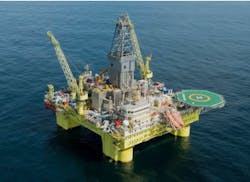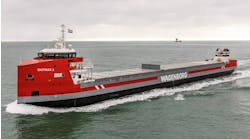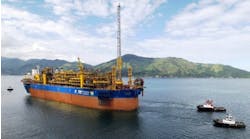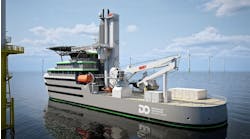Offshore staff
KONGSBERG, Norway – Kongsberg Maritime, COSL Drilling Europe, and NOV are collaborating on an environmental development concerning drilling operations offshore Norway.
COSL has initiated its Energy Control project to reduce its greenhouse gas emissions and fuel/maintenance overheads on its rigs in the North Sea.
The integrated solution combines Kongsberg Maritime’s energy management systems with NOV’s research into energy optimization.
Analysis of historical data on estimated maximum power consumption at the semisubmersible DP-3 rigs COSLPromoter and COSLInnovator showed that changes could be made to avoid having to run all six 4,800-kW Wärtsilä Vasa 12V32 diesel during drilling.
NOV used the data to devise a new software update for optimal energy usage, while Kongsberg Maritime used the estimates to develop a means of controlling onboard energy production and distribution.
One priority was to limit and optimize generator usage. The team concluded that each rig would be able to perform full drilling operations using on average only three of its diesel generators.
By halving the generator capacity, the engines are said to operate at higher loads. This, coupled which the switch-off of the other units, leads to improved fuel efficiency, reduced carbon deposits, and lessened maintenance requirements.
Analysis suggests annual reductions in fuel consumption of around 2,300 metric tons (2,535 tons), CO2 emissions reduced by 7,300 metric tons (8,047 tons) and NOx by 125 metric tons (138 tons) – an overall saving in fuel and emissions of more than 25%.
The project has support from the Norwegian government’s NOx Fund, designed to cut NOx emissions.
Kongsberg Maritime said its DP system technology is key to maintaining the efficiency of the rigs’ installed thrusters, allowing a dynamic load prediction strategy to be adopted that anticipates thruster requirements.
The resulting eradication of spikes is said to account for a significant portion of the overall fuel saving.
A KONGSBERG K-IMS (Information Management System) collates the rigs’ performance data and uploads it to the cloud, allowing ongoing improvements to be verified against benchmarked data.
K-IMS data is at present being used as an informational basis for setting up a shore-based operations center at COSL’s main office in Stavanger, Norway.
COSL project leader Torfinn Kalstø said: “We can now accomplish complete drilling operations on COSLPromoter and COSLInnovator while using less than 20 metric tons [22 tons] of fuel per day, with scope to reduce that figure even further.”
Morten Firing, operations manager, Global Customer Support Offshore & LNG, at Kongsberg Maritime added: “The built-in digital solution for receiving real time performance data on shore will allow for continuous improvement in all aspects of rig operation for the future.”
02/03/2021




